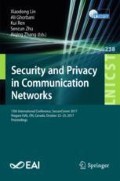Abstract
Return-oriented programming (ROP) and jump-oriented programming (JOP) are two most common control-flow hijacking attacks. Existing defenses, such as address space layout randomization (ASLR) and control flow integrity (CFI) either are bypassed by information leakage or result in high runtime overhead. In this paper, we propose FRProtector, an effective way to mitigate these two control-flow hijacking attacks. FRProtector shuffles the functions of a given program and ensures each function is executed from the entry block by comparing the unique label for it at ret and indirect jmp. The unique label is generated by XORing the stack frame with return address instead of with a random value and it is saved in a register rather than on the stack. We implement FRProtector on LLVM 3.9 and perform extensive experiments to show FRProtector only adds on average 2% runtime overhead and 2.2% space overhead on SPEC CPU2006 benchmark programs. Our security analysis on RIPE benchmark confirms that FRProtector is effective in defending control-flow hijacking attacks.
Access this chapter
Tax calculation will be finalised at checkout
Purchases are for personal use only
References
Heelan, S.: Automatic Generation of Control Flow Hijacking Exploits for Software Vulnerabilities (2009)
Andersen, S., Abella, V.: Data execution prevention. changes to functionality in microsoft windows XP service pack 2, part 3: memory protection technologies (2004)
Shacham, H.: The geometry of innocent flesh on the bone: return-into-libc without function calls (on the x86). In: ACM Conference on Computer and Communications Security, CCS 2007, Alexandria, Virginia, USA, pp. 552–561, October 2007
Bletsch, T., Jiang, X., Freeh, V.W., Liang, Z.: Jump-oriented programming: a new class of code-reuse attack. In: ACM Symposium on Information, Computer and Communications Security, pp. 30–40 (2011)
Cowan, C., Pu, C., Maier, D., Hintony, H., Walpole, J., Bakke, P., Beattie, S., Grier, A., Wagle, P., Zhang, Q.: StackGuard: automatic adaptive detection and prevention of buffer-overflow attacks. In: Conference on Usenix Security Symposium, p. 5 (1998)
PaX Team: Pax address space layout randomization (ASLR) (2003)
Abadi, M., Budiu, M., Erlingsson, Ú., Ligatti, J.: Control-flow integrity. In: ACM Conference on Computer and Communications Security, pp. 340–353 (2005)
Abadi, M., Budiu, M., Erlingsson, Ú., Ligatti, J.: Control-flow integrity principles, implementations, and applications. ACM Trans. Inf. Syst. Secur. (TISSEC) 13(1), 4 (2009)
Zhang, M., Sekar, R.: Control flow integrity for cots binaries. In: Usenix Security, vol. 13 (2013)
Zhang, C., Wei, T., Chen, Z., Duan, L., Szekeres, L., McCamant, S., Song, D., Zou, W.: Practical control flow integrity and randomization for binary executables. In: 2013 IEEE Symposium on Security and Privacy (SP), pp. 559–573. IEEE (2013)
Mohan, V., Larsen, P., Brunthaler, S., Hamlen, K.W., Franz, M.: Opaque control-flow integrity. In: NDSS Symposium (2015)
Bittau, A., Belay, A., Mashtizadeh, A., Mazieres, D.: Hacking blind. In: IEEE Symposium on Security and Privacy, pp. 227–242 (2014)
Strackx, R., Younan, Y., Philippaerts, P., Piessens, F., Lachmund, S., Walter, T.: Breaking the memory secrecy assumption. In: European Workshop on System Security, Eurosec 2009, Nuremburg, Germany, pp. 1–8, March 2009
Wilander, J., Nikiforakis, N., Younan, Y., Kamkar, M., Joosen, W.: RIPE: runtime intrusion prevention evaluator. In: Twenty-Seventh Computer Security Applications Conference, ACSAC 2011, Orlando, Fl, USA, 5–9 December, pp. 41–50 (2011)
Snow, K.Z., Monrose, F., Davi, L., Dmitrienko, A.: Just-in-time code reuse: on the effectiveness of fine-grained address space layout randomization. In: Security and Privacy, pp. 574–588 (2013)
The LLVM compiler infrastructure. http://llvm.org/
Szekeres, L., Payer, M., Wei, T., Song, D.: SoK: eternal war in memory. In: IEEE Symposium on Security and Privacy, pp. 48–62 (2013)
Damm, C.H., Hansen, K.M., Thomsen, M.: Tool support for cooperative object-oriented design: gesture based modelling on an electronic whiteboard. In: Proceedings of the SIGCHI Conference on Human Factors in Computing Systems, pp. 518–525. ACM (2000)
Göktas, E., Athanasopoulos, E., Bos, H., Portokalidis, G.: Out of control: overcoming control-flow integrity. In: IEEE Symposium on Security and Privacy, pp. 575–589 (2014)
Sadeghi, A., Niksefat, S., Rostamipour, M.: Pure-call oriented programming (PCOP) chaining the gadgets using call instructions. J. Comput. Virol. Hacking Technol. 14, 1–18 (2017)
Gupta, A., Habibi, J., Kirkpatrick, M.S., Bertino, E.: Marlin: mitigating code reuse attacks using code randomization. IEEE Trans. Dependable Secur. Comput. 12(3), 1 (2015)
Fu, J., Zhang, X., Lin, Y.: Code reuse attack mitigation based on function randomization without symbol table. In: Trustcom, pp. 394–401 (2016)
Onarlioglu, K., Bilge, L., Lanzi, A., Balzarotti, D., Kirda, E.: G-free: defeating return-oriented programming through gadget-less binaries. In: Computer Security Applications Conference, pp. 49–58 (2010)
Li, J., Wang, Z., Jiang, X., Grace, M., Bahram, S.: Defeating return-oriented rootkits with “return-less” kernels, pp. 195–208 (2010)
Prakash, A., Yin, H.: Defeating ROP through denial of stack pivot. In: Computer Security Applications Conference, pp. 111–120 (2015)
Yan, F., Huang, F., Zhao, L., Peng, H., Wang, Q.: Baseline is fragile: on the effectiveness of stack pivot defense. In: IEEE International Conference on Parallel and Distributed Systems, pp. 406–413 (2016)
Acknowledgment
Supported by the National Natural Science Foundation of China (61373168, U1636107), and Doctoral Fund of Ministry of Education of China (20120141110002).
Author information
Authors and Affiliations
Corresponding author
Editor information
Editors and Affiliations
Rights and permissions
Copyright information
© 2018 ICST Institute for Computer Sciences, Social Informatics and Telecommunications Engineering
About this paper
Cite this paper
Fu, J., Jin, R., Lin, Y. (2018). FRProtector: Defeating Control Flow Hijacking Through Function-Level Randomization and Transfer Protection. In: Lin, X., Ghorbani, A., Ren, K., Zhu, S., Zhang, A. (eds) Security and Privacy in Communication Networks. SecureComm 2017. Lecture Notes of the Institute for Computer Sciences, Social Informatics and Telecommunications Engineering, vol 238. Springer, Cham. https://doi.org/10.1007/978-3-319-78813-5_34
Download citation
DOI: https://doi.org/10.1007/978-3-319-78813-5_34
Published:
Publisher Name: Springer, Cham
Print ISBN: 978-3-319-78812-8
Online ISBN: 978-3-319-78813-5
eBook Packages: Computer ScienceComputer Science (R0)

